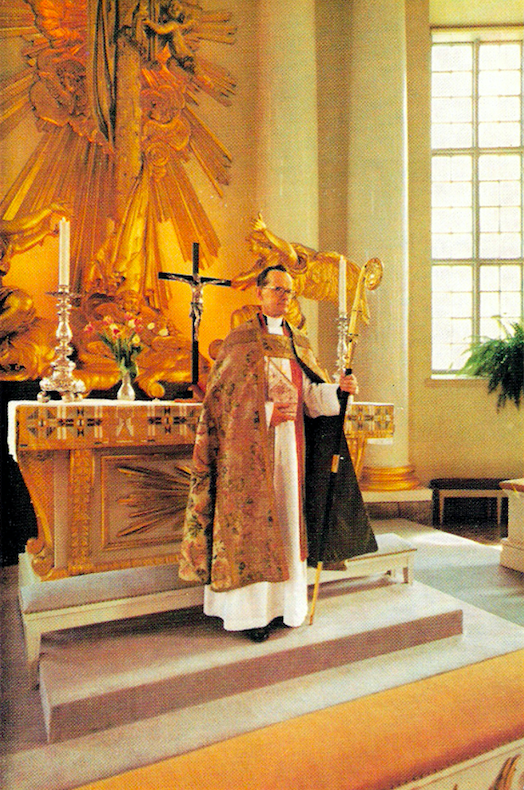
In the wake of a 1931 trip to Palestine, PhD hopeful Bo Giertz’s experience of scripture reached new depths. A physical encounter with the biblical context freed Giertz to “read his Bible with completely new eyes. It smelled of earth and daily life. It reflected a reality that one could still see with their own eyes.”

Lakeside at the Sea of Galilee
It was this personal, sensory experience of the Biblical backdrop that informed Giertz’s writing of With My Own Eyes — a vibrant, third-person retelling of the gospels. Stuffed with scenery and contextual insight, With My Own Eyes brings color to all the classic accounts of Jesus’ life. It’s easier read than describe — so feast your eyes on this excerpt from Giertz’s retelling of Luke’s Road to Emmaus account:
That such beauty could inhabit a world that was so grim!
Cleopas glanced over the powerful heights. Their crests were flat and wide, but they bowed toward the valley in slopes that were ever steeper the closer they came to the white ravine at the bottom of the valley. Each slope stepped down in stair-like ledges. They were all covered in verdant vegetation and lined with blue shadows that grew ever longer in the evening sun.
The path followed along one side of the valley. One after another terebinth stood wide and leafy between the low stone walls. Thousands upon thousands of blood-red anemones could be seen on the slopes, and there, between stone slabs peeked out brown and blue. Swallows swept by, the skies were clear blue, and it was completely quiet among the desert mountains. Only far away in the village on the horizon did the children laugh while they played, and their shrill voices sounded like the songs of birds in the tranquility.
He looked at the other man who walked with his head hanging and hadn’t said a word in a long time. He surely felt the same. Of what concern was the beauty of spring to them? For them, the time of miracles had passed, and the sun they had thought would dispel the darkness over Israel forever had been extinguished.
Jesus had still been a prophet powerful in word and deed before God and all people. They had heard him over again, every time he came to Jerusalem. They had been convinced that he was the one who would redeem Israel. They had believed that this Passover would be a time of miracles as memorable as the Passover when the Lord brought his people up out of Egypt. They had heard him every day in the temple; they had prepared themselves with prayer and repentance to be worthy. They had become more and more confident that God’s time was near.
And then for it to end as it did! They had seen the high priest sneer on the way from the place of execution. They had heard the temple guard mingle among the pilgrims in preparation, and jeer at this pitiable braggart who tore down the temple and drove the clouds of heaven and still did not know that one of his own had gone and fetched the police!
There was a wall of contempt and hatred that would surround the name of Jesus for all future generations, if it was even remembered. There was nothing to do about the matter. God’s ways were inconceivable, and all one could do was bow to them. So they had turned back to tend to their vineyards and their ripening wheat fields.
It was a relief when they were able to take up company with one of the thousands of Passover observers returning from the holiday. He caught up with them where the valley turned and the path went up to the wide flat ridge. He asked them what it was that bothered them as they walked so that they talked about it the whole way. They stopped and looked at him almost reproachfully. Was he a stranger in Jerusalem who did not know what had happened there?
Bo Giertz, 1965
“What then?” he asked, and they opened their hearts and let all their bitterness and disappointment flood out. They did not hide that they regarded Jesus as a great prophet and that they had hoped that he would be the one to redeem Israel. And when the stranger didn’t contradict them or sneer at them, they also told him what had happened today: how the women found the grave empty, how they spoke of seeing angels and said that he lived, that a few of their own went and confirmed that the grave was empty as the women had said, but that there was no trace of him.
Then the man began to rebuke them, not because they had been gullible and followed an imposter, but because they were so skeptical and had too little faith to believe in all that the prophets had said. Had they never understood that the Messiah must suffer all this in order to enter into his glory? Had they never read that this was what would happen when the Holy One of God came to earth?
Then he began to instruct them. He went through Moses and the prophets and all the scriptures and showed how they all were filled with talk about the Messiah, how he was modeled and heralded, and how it was written of him that he must suffer and be rejected to fulfill God’s will and redeem all people. Was it not written that he would be a guilt offering and that the Lord’s will would then have success through him?
The sun had begun to sink before them, the colors on the mountain became deeper, and the odor of the ground became stronger. While they walked, the past began to shine with new splendor, and their eyes were amazed to see the ways of God with a clarity they had never before known. They saw that the Lord’s chosen servant would be rejected and betrayed by men, so despised that his own would regard him as nothing and be offended for his sake. But he bore their infirmities, and he took their pain upon himself. Yes, it was written that he would be wounded for their transgressions and would be beaten for the sake of their misdeeds.
Like a gray strand of pearls sewn into the blue-velvet hem of the shadow, the long stone wall made its way over the back of the mountain. The sun was so low that it strewed splashes of gold through the grass. It was completely still, and one heard the hum of the swallows that chased by. They saw everything with dreamy eyes. The veil had been lifted, and they had seen the image of God’s own Messiah: the king who came to his people, humble and riding on a donkey to bear the sins of many and to intercede for the transgressors; he who had been tormented though he humbled himself and opened not his mouth but stood quietly when he was reviled.

COMMENTS
Leave a Reply













